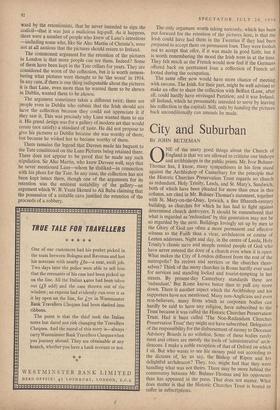City and Suburban
BY JOHN BETJEMAN 0 NE of the many good things about the Church of England is that we are allowed to criticise our bishops and archbishops in the public prints. Mr. Ivor Bulmer- Thomas has, I know, many sympathisers in his firm stand against the Archbishop of Canterbury for the principle that the Historic Churches Preservation Trust regards no church as redundant. Holy Trinity, Leeds, and St. Mary's. Sandwich. both of which have been pleaded for more than once in this column, are cited in Mr. Bulmer-Thomas's statement, together with St. Mary-on-the-Quay, Ipswich, a fine fifteenth-century building, as churches for which he has had to fight against determined church destroyers. It should be remembered that what is regarded as 'redundant' by this generation may not be so regarded by the next. Buildings lovingly set up by men to the Glory of God are often a more permanent and effective witness to the Faith than a vicar, archdeacon or course of Lenten addresses. Night and day, in the centre of Leeds, Holy Trinity's classic nave and steeple remind people of God who have never entered the door of a church even when it is open. What makes the City of London different from the rest of the metropolis? Its rectors and services or the churches them- selves? Think of the many churches in Rome hardly ever used for services and standing locked and tourist-tempting in her streets. By present-day Canterbury standards these are 'redundant.' But Rome knows better than to pull any more down. There is another aspect which the Archbishop and his supporters have not mentioned. Many non-Anglicans and even non-believers, many firms which as corporate bodies can hardly be said to have any religion, have subscribed to the Trust because it was called the Historic Churches Preservation Trust. Had it been called `The Non-Redundant Churches Preservation Trust' they might not have subscribed. Delegation of the responsibility for the disbursement of money to Diocesan Advisory Boards is no solution. Some of these bodies rarely meet and others are merely the tools of `administrative' arch- deacons. I make a noble exception of that of Oxford on which I sit. But who wants to see his money paid out according to the dictates of, let us say, the Bishop of Ripon and his delightful archdeacon? They, too, might feel that they were handling what was not theirs. There may be more behind the controversy between Mr. Bulmer-Thomas and his opponents than has appeared in the press. That does not matter. What does matter is that the Historic Churches Trust is bound to suffer in subscriptions.


















































 Previous page
Previous page